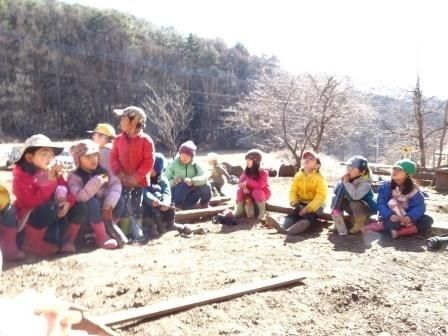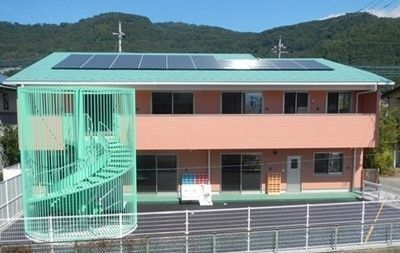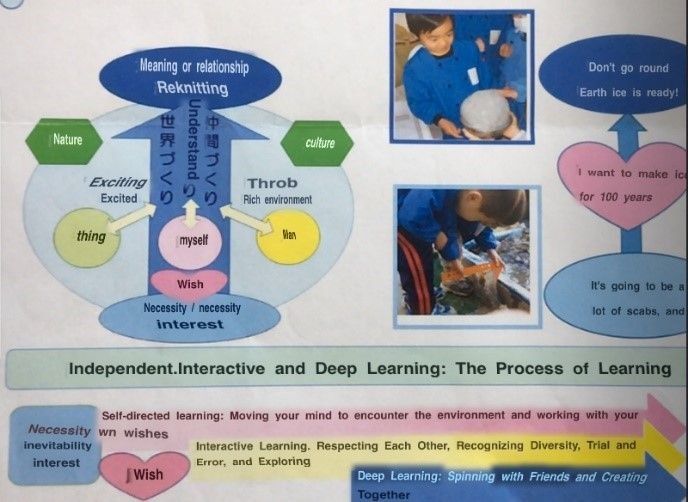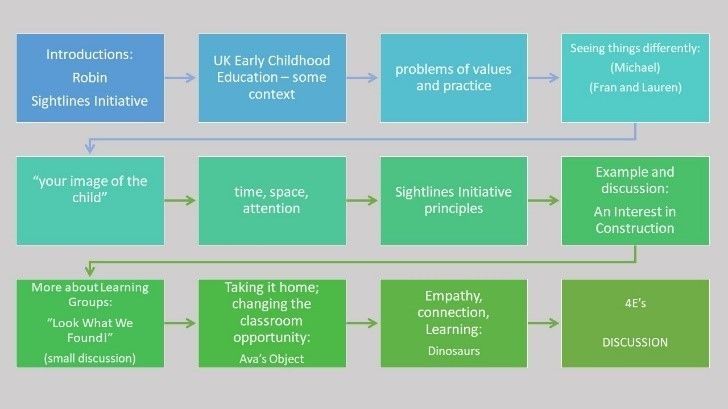
 I am just back from encounters with a network of early childhood educators in Yamanashi prefecture, a large district to the West of Tokyo.
I am just back from encounters with a network of early childhood educators in Yamanashi prefecture, a large district to the West of Tokyo.
The plan has grown over conversations spanning a few years, following Professor Asami Akiyama's participation in a Sightlines Initiative Reggio Study group some years ago. We have been able to have good discussions during this time, as she has been doing research at Newcastle. We discussed many things, including the action-research projects of Sightlines (in 2018 we held an online seminar on 'Adventuring in Early Childhood Education') the varying fortunes of early childhood education in the UK, governments' general attitudes to education and creating autonomous professional development movements.
Professor Akiyama is involved with a network of early childhood educators in the district of Yamanashi, and also working to influence the direction of the Prefecture's early childhood policy and services, and her invitation was intended to help shift thinking and practice. From my perspective it was a wonderful opportunity to test out how our work and principles would be examined by an entirely fresh group of educators, and also to begin to discover how this new-to-me culture valued children, and education.
For me, it has been extremely energising, refreshing and reassuring to encounter early childhood services - I was able to visit three centres of different types – and the network group – which weren't ground down by effects of egregious government policy.Consistently I met with happy places and people – children, educators, parents. The educators and schools were all in their different ways committed, grounded, researchful, curious and above all loving and humane with their children and their overall intents. A phrase from the UK Children's Act came to mind – 'the welfare of the children is paramount' – would that were actually the case in the UK. We have all learnt much from the encounter so far, and are motivated to continue and develop further.
I was able to make two presentations, and three visits to early childhood centres – which were very important in being able to make a context for talking about our material and experiences. The first was a two-hour talk with the invitation to talk about "generally democratic early childhood education and care beyond listening) to the UK, with explanation of evaluation and other educational system and what is difficult and how you are fighting with other people who concern and are interested in the education you focus on." The second organised opportunity was to work with the network group in a discussion about a particular documentation from one of the kindergartens. (NB in Japan the early years centres have purposefully steered away from the label of 'preschool', associating both parts of that label with unwanted connotations (both 'pre' and 'school.')
Other discussions were about the interest in creating an early years creative centre for the prefecture, and how an exploratorium, of the type Sightlines Initiative have previously created, could be useful in helping shifts in thinking, aspiration and practice.
Piccolo Centre"Surrounded by mountains and forests of Tsugane, there are streams and fields, and the garden has many wildflowers and flowers. In dazzling nature, you can touch various lives, feel the breath, and the severe cold of winter will greatly grow the body and mind of children.
Children shine by being free to time, having real freedom, and being accepted as they are. The nursery believes in the child's sensibility, imagination, and ability to think, and does not look over his mouth. Watching means that there is a wish. Put the place on the child's palm in the hope of becoming such a child. On top of that, they believe and wait for their children.
Crying, laughing, fighting. In this unregulated forest, children express their emotions, emotions, and emotions equally, shake their hearts and feel their feelings. We believe it is a source of deepening and deepening our hearts."http://mori-piccolo.jp/?page_id=257
This is a remarkable forest kindergarten in Hokuto City, Yamanashi Prefecture, founded and co-led by Kumiko Nakajima. There is a strong ethic of listening, taking time to explore and resolve (or understand and live with) differences between people, to support and include everyone, to listen and be listened to. The atmosphere is calm, collected, competent and considerate and the children (a mixed group of 26 2 – 5 year olds) really participate and work together closely. The centre team comprise local parents who are, or have become, educators and who particularly value this centre. They are certainly motivated by dedication to their ethic, rather than income – the centre operates very frugally, and I think much time is donated. Perhaps an operational equivalent could be the UK 1960s voluntary preschool playgroups, created and sustained by dedicated groups of mothers.
At the gathering time, the children's question was 'how can we talk with him (Robin) if we don't speak English and he doesn't speak Japanese?' They talked together, with the question encouraged and reflected by Komiko, till a girl said, 'I think she (Asami) speaks English – we could ask her the right words – but I am too shy to say them.'The boy who had led the question said 'you ask Asami, and I'll say them.' Which they did – it was a nice introduction.
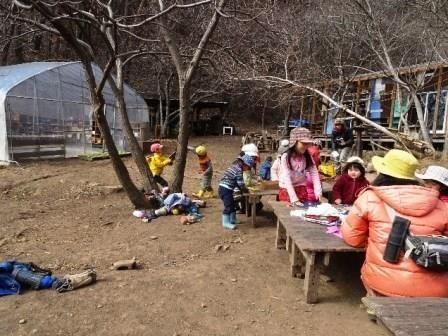
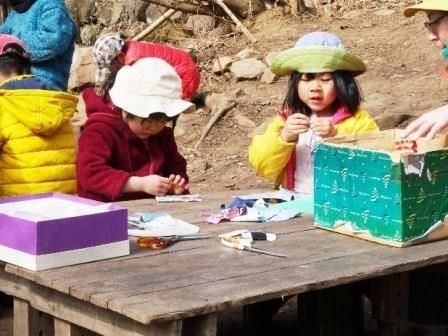
We later saw how the children worked to prepare for the day's chosen 'free' activity - painting, unstacking the necessary tables from the open store and manoeuvring them, with the watchful and non-interfering eye of an educator, and clearing everything away afterwards.
(Later, during their lunch, there was an involved discussion about how they were upset that some younger children hadn't helped the children pack and stack the tables –and the younger children also said that they felt bad about the situation – and began to discuss the justice of the situation, and how people should feel and act.
There was a core of generosity, respect and rich love of children and children's right to be and explore. We felt this in all three of our visits. The open physical nature of this preschool – an open yard bounded by a road on one side and a forest on the other, and its thoroughly engaged adults and children, demonstrated this quality particularly strongly.
The painting is now finished, and other activities are under way - in the background children are fixing wood with hammers and nails, in the foreground is a sewing group. the boys by the tree are having a joust with sticks ('swords')
Independent kindergarten: Seiya Children's Garden
"Children living in this increasingly unstable, uncertain, complex and ambiguous world. When the age of 0 to 2 years old grows up, the heart to walk forward and full of hope is completed, the building is suitable for the environment. We hope that you will be as familiar as ever."
Developed as a neighbourhood facility over a long period, led by director Nobuyuki Suzuki. It is private, but with a prime motive of serving the community: " For more than 50 years since its establishment, I have been watching the healthy growth of children based on the Christian spirit. With the three pillars of "cultivating the mind", "development of skills" and "building a healthy body", we will nurture "people who are actively involved in others" who will live powerfully in the future society."
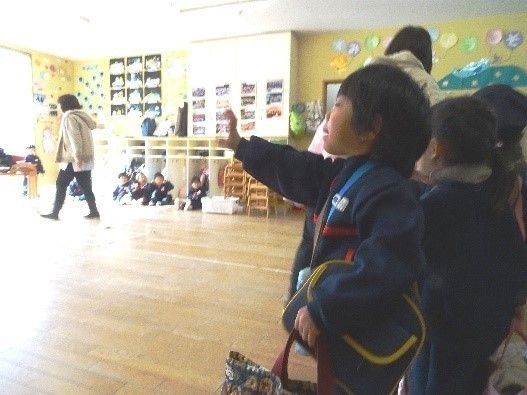 The morning class gatherings we saw had a great sense of enjoyment – they were arranging a regular split , with the three year olds and four year olds splitting and mixing with one another , and they waved and shouted goodbye to their classmates as they went off with obvious eager anticipation.
The morning class gatherings we saw had a great sense of enjoyment – they were arranging a regular split , with the three year olds and four year olds splitting and mixing with one another , and they waved and shouted goodbye to their classmates as they went off with obvious eager anticipation.
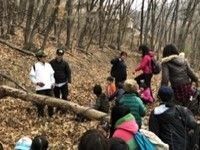
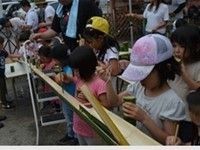
Yamanashi University attached Kindergarten
http://www.kinder.yamanashi.ac.jp/
this is a comparatively large kindergarten with four classes. The staff have a keen research attitude to what they do, initiated by the previous director and assiduously upkept by Hiromi, the current head of centre.
Introduction Brochure extract:
"Focus: To bring up a child who plays well
Play in early childhood education itself can be said to be 'independent, interactive and deep learning'. In light of the announcement of the new kindergarten education guidelines, the school has been focusing on the relationship between enhanced play and the learning there, and is deepening its consideration. This is trying to make the childhood experience that leads to post-school education more reliable." "In the kindergarten, children see themselves as the protagonists of the kindergarten life, which creates their own lives with their own wishes and objectives, and encourages them to play and engage in activities. Each of us aims to create a kindergarten life by moving our hearts in encounters with the environment, expanding the fun of the child, and repeating dialogue with things, people and self. In a life of enthusiasm, we find ourselves, our own wishes and objectives, and talk with our peers, by respecting each other and respecting diversity."
Looking through their material later, a quote has taken me to read more about analysis of education in Japan and a resurgence of 'learning community education' as a reaction to damaging effects of economic reductionism:
"The process of reshaping meaning and relationships from the creation of a meaningful world, companionship and, and self-development through encounters and conversations with things, people and myself is considered 'learning.'" Children Fleeing from Learning – booklet by Manabu Sato, Professor Emeritus at the University of Tokyo and Professor at Gakushuin University.
Later reading into Professor Sato's accounts and work [see extracts in article notes] is giving a valuable insight into the history and journey of ethical construction which these centres are undertaking. It also gives hope and a context to the efforts of construction which many UK early childhood centres and others are making in the current UK Government emphasis on testing and instruction as the baseline for education: Japan has had a similar experience, but its educators are now at a resurgent point in the work of offering meaning-centred education.
A key point of our visit to the Centre was that one of the educators, Ryosuke, was due to present a documentation for discussion that evening, and this gave us a valuable context. Ryosuke's class of three-year olds had been investigating the geology and geography of the nearby districts around Mount Fuji, and were keen to show and discuss their rock samples – and also to investigate where England was.
In their courtyard they have been digging down to the substrate – the excavation is quite advanced by now.
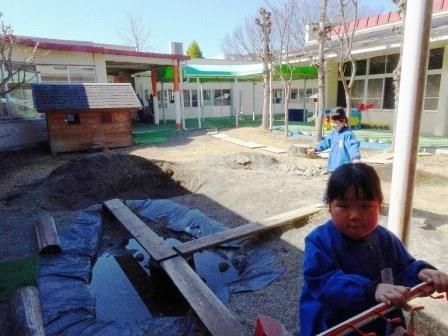
Conference hosted by Yamanashi University: The Courage of Utopia - Robin Duckett
The title is 'borrowed' from the title of an article by Carla Rinaldi in Making Learning Visible. During our preparation – and during our visits – the topic of 'courage' was never far from our minds. The group we presented to was a group of about fifty early childhood educators of many different types, lecturers and researchers from across Yamanashi prefecture.
The general approach I used, and prepared with Asami, was similar to that in our chapter The Courage of Utopia, in Colwyn Trevarthen's 2018 OUP publication The Child's Curriculum.
Asami and I prepared and translated much more material than we had time to use – in fact we had time for one detailed narrative, which we took from 'Adventuring in Early Childhood Education.' (We chose it for its exploration into the novel development of learning groups into a hitherto undifferentiated situation, and its detail.) We remarked later that this means we have more translated material for a later date, which seemed to be a most welcome idea. The presentation was a big team effort – Asami translating the slides beforehand, and also providing live translation (English is not much spoken.) Because Asami know the material well her capacity was much more than translator – it was also interpreter.
I could not but quote from Loris Malaguzzi's 1993 speech 'Your Image of the Child – Where Teaching Begins'; examples I used in 'Seeing Things Differently' came from personal experience as a nursery teacher (see ReFocus Journal 4 article) and video of neighbourhood 2-yearold children (from 1984 video Woodbine Place – Siren Films). The 'green chapters' we did not have time for, apart from discussion time – the material here is from Learning to Learn in Nature (another time!)
We found that people were eager to stay and talk, with much interest in reflecting and deepening threads of learning through learning groups of children of many age groups, the possible roles, responsibilities and opportunities of the adults, making learning visible (encountering official expectations, whilst helping them support learning more deeply).
Kofu Early Childhood Reflection Group - CPD Group Seminar
Ryosuke, educator at the university Kindergarten presented a closely documented narrative on his input with a child of his class, over two years, focussing on issues of belonging and socialisation. One of the most interesting aspects of this reflection opportunity was that I tended to critique the system, its expectations and culture, whereas the expected direction of the narrative, and the group participants, was towards problemmatising how the child 'fitted in' and the strategies of the educator. We realised that even 'simple' narratives can be doorways into larger system critiques, if we are ready to 'zoom out.'
I am hoping that the dialogues will continue and grow. I am reading articles from Piccolo, and backgrounds of recent change in early childhood education Japan, by Professor Manabu Sato; Japanese colleagues are making their own reflections, and have already enquired about encounters and exchanges with Sightlines Initiative Network Centres. Quite besides that, it has also heightened their interests in direct encounters with that important mutual frame of reference, the preschools of Reggio Emilia.


